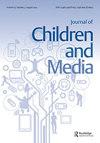Datafied Childhoods: data practices and imaginaries in children’s lives
IF 2.1
3区 心理学
Q2 COMMUNICATION
引用次数: 6
Abstract
In an online talk I recently organized on data-driven environments, one of this book’s authors discussed how children are growing up monitored by their parents’ digital devices and by schools and educational platforms, without regard for their privacy rights. At the end, a participant wrote in the chat: “An amazing presentation. But also the most depressing talk I have heard for some time – and I work on climate change!” That participant also asked whether there was “any gap or glimmer of an alternative future to the one that the tendencies mapped out is leading to”. In the first pages of Datafied Childhoods, Mascheroni and Siibak seem to address that question. They note that “there are reasons to believe that this is an opportune moment, given current trajectories, to call into question the continued datafication of childhood at home, at school, and in a child’s peer group, and to imagine a different future in which data are repurposed for the social good and best interests of children” (p. 3). Mascheroni and Siibak aim to counter the opacity that surrounds the datafication of childhood, a topic that has been far less researched or present in news coverage than other risky consequences of the digital environment for children. For that purpose, chapter 2 presents three theoretical pillars that make it possible to go beyond a strict view of datafication as a data-driven business or political governance model:数据化儿童:儿童生活中的数据实践和想象
在我最近组织的一次关于数据驱动环境的在线讲座中,本书的一位作者讨论了孩子们是如何在父母的数字设备、学校和教育平台的监控下成长的,而不考虑他们的隐私权。最后,一位参与者在聊天中写道:“这是一个令人惊叹的演讲。但也是我一段时间以来听到的最令人沮丧的演讲——我致力于气候变化!”该参与者还询问,“与所规划的趋势相比,是否存在任何差距或一线替代未来”。在《数据化的童年》的第一页中,Mascheroni和Siibak似乎解决了这个问题。他们指出,“有理由相信,鉴于目前的发展轨迹,这是一个恰当的时机,可以质疑儿童在家、学校和同龄人群体中的持续数据化,并想象一个不同的未来,在这个未来,数据将被重新用于儿童的社会利益和最大利益”(第3页)。Mascheroni和Siibak旨在对抗围绕儿童数据化的不透明性,与数字环境对儿童的其他风险后果相比,这个话题在新闻报道中的研究或报道要少得多。为此,第2章提出了三个理论支柱,使其有可能超越数据化作为数据驱动的商业或政治治理模式的严格观点:
本文章由计算机程序翻译,如有差异,请以英文原文为准。
求助全文
约1分钟内获得全文
求助全文

 求助内容:
求助内容: 应助结果提醒方式:
应助结果提醒方式:


